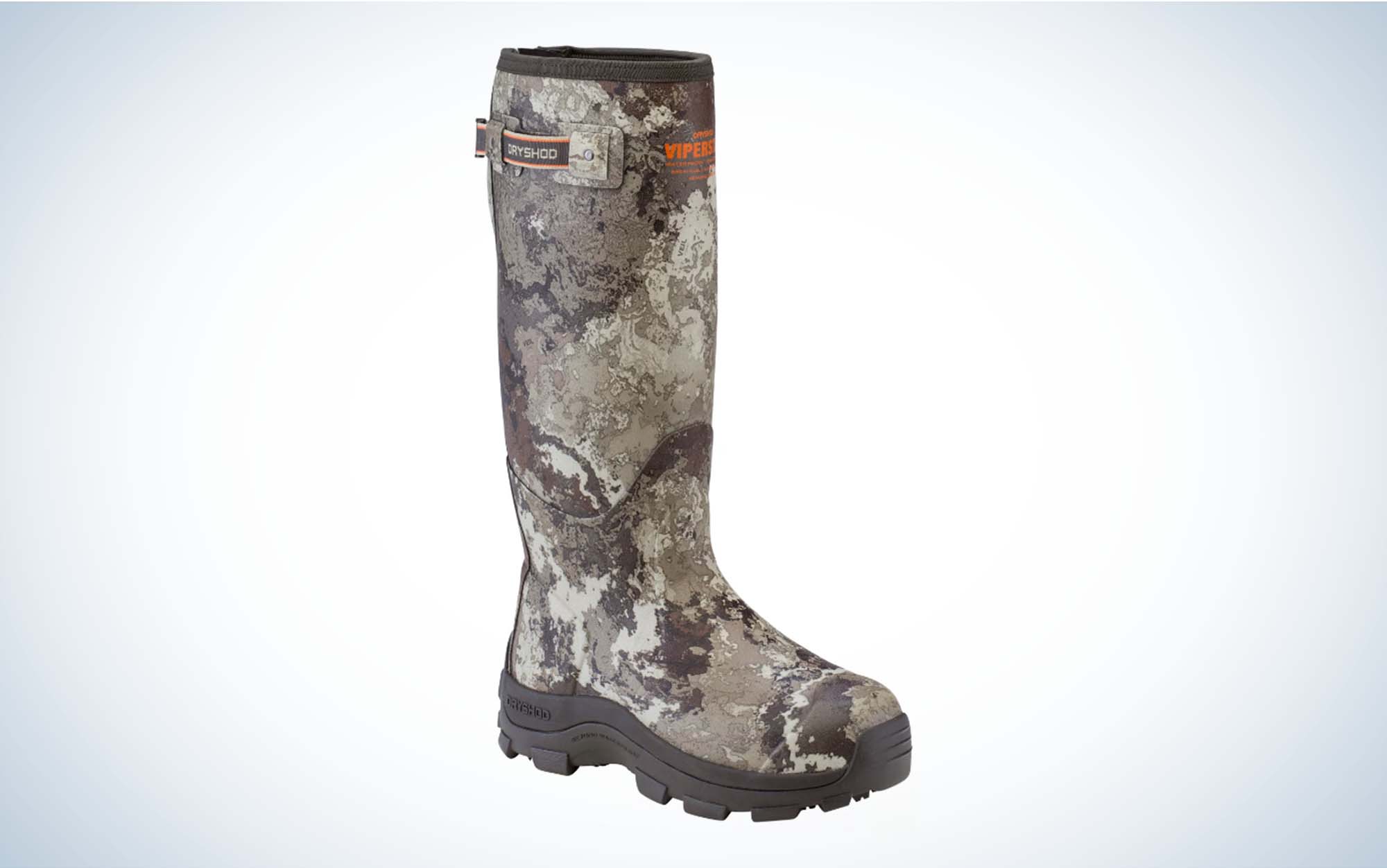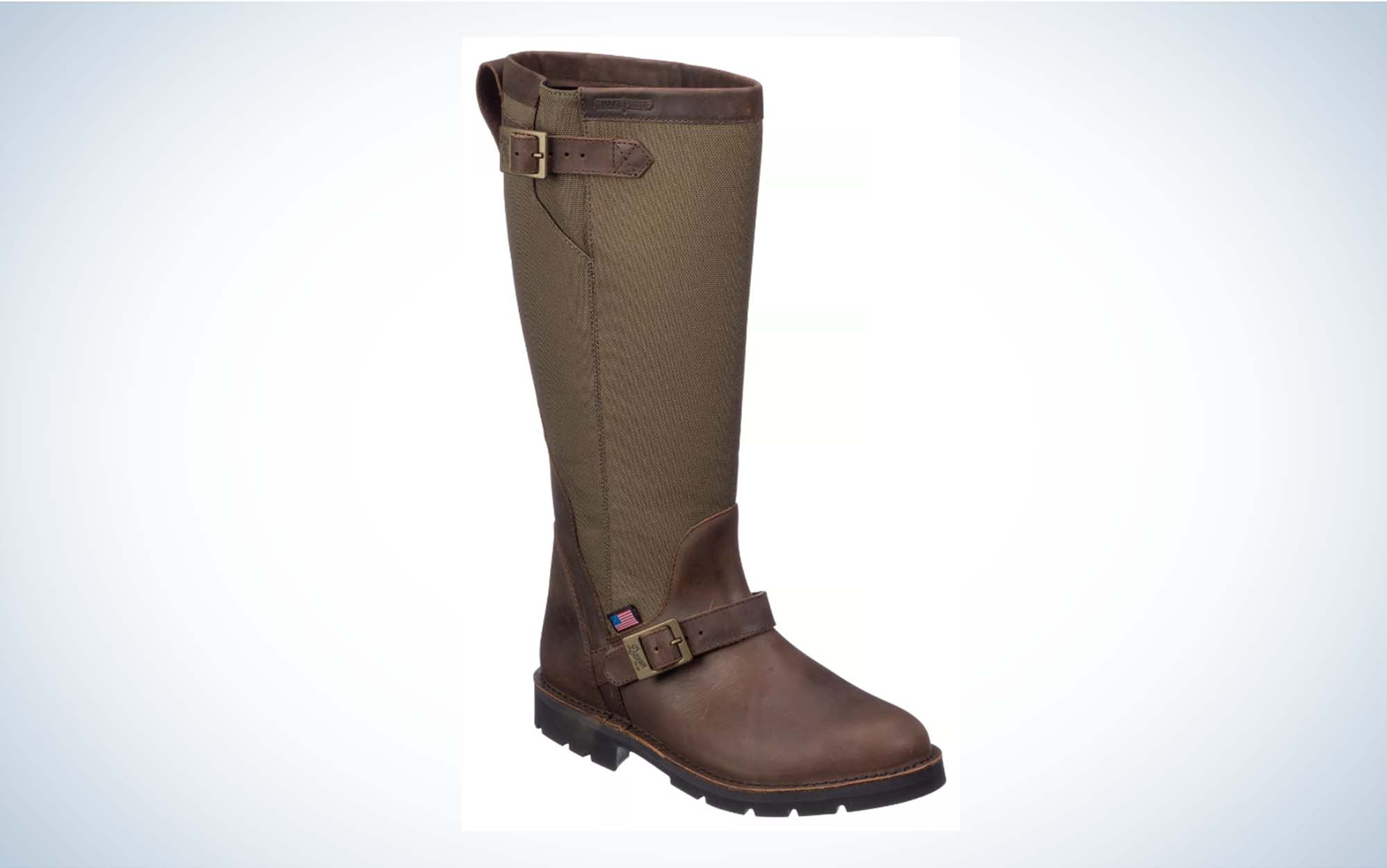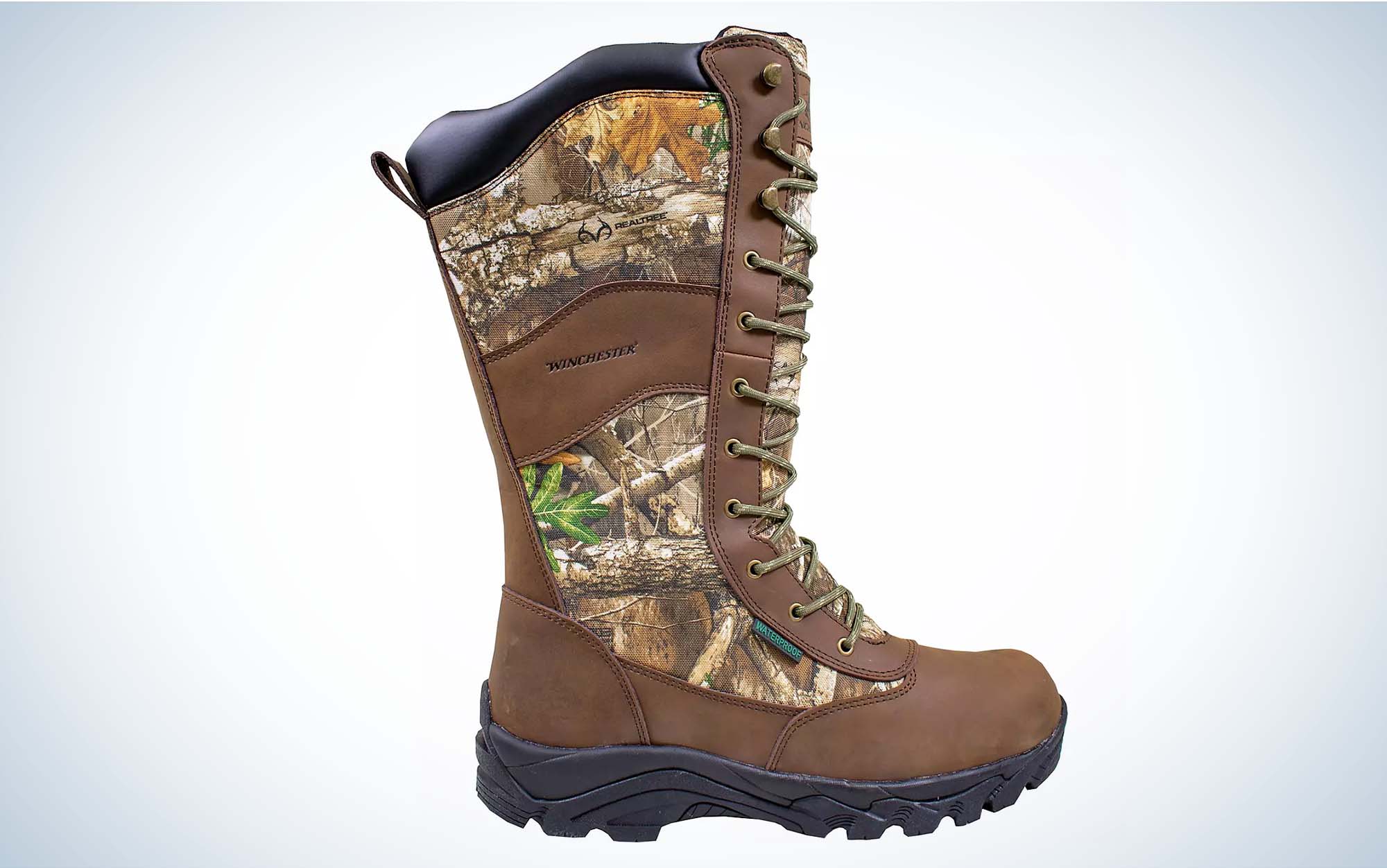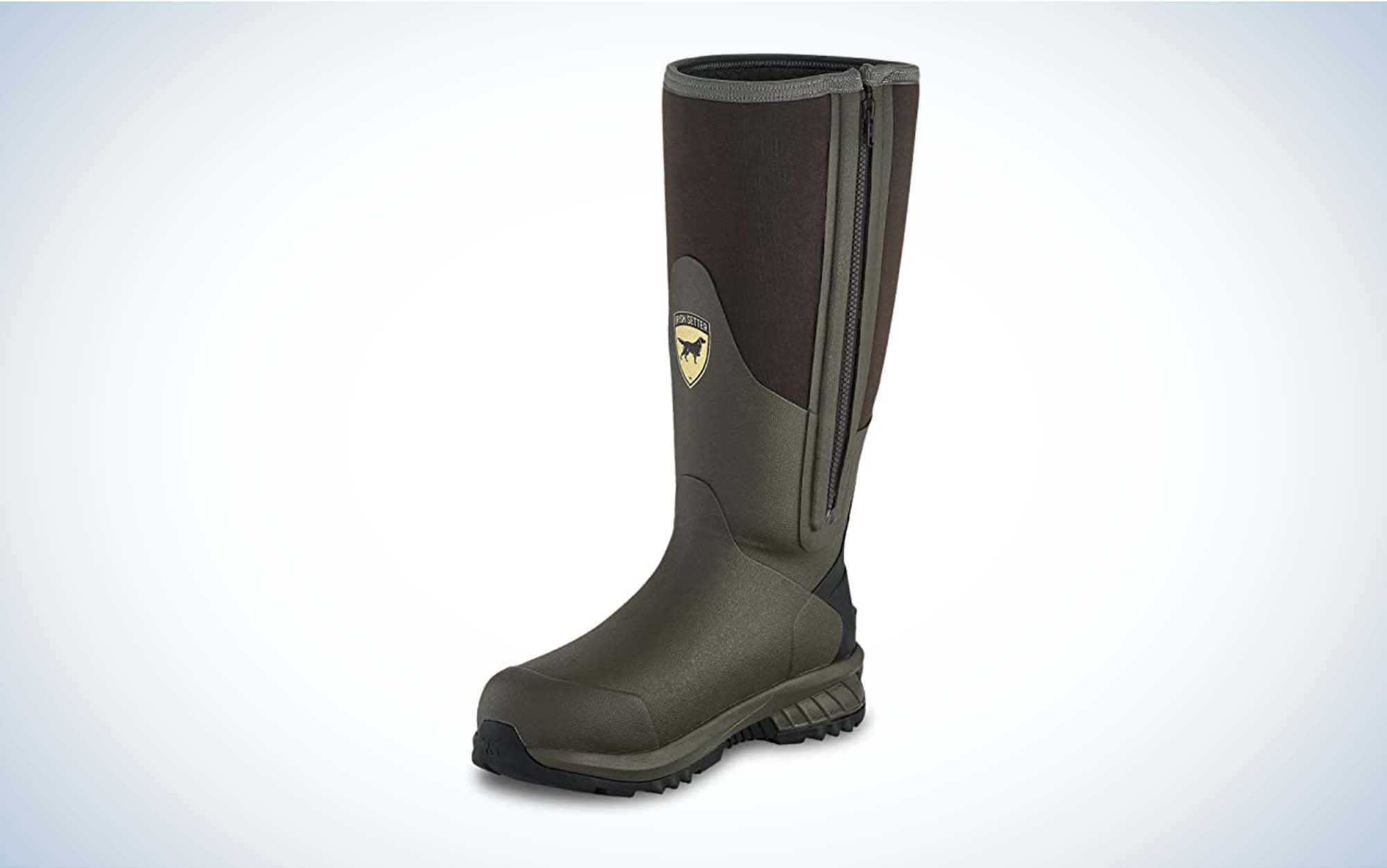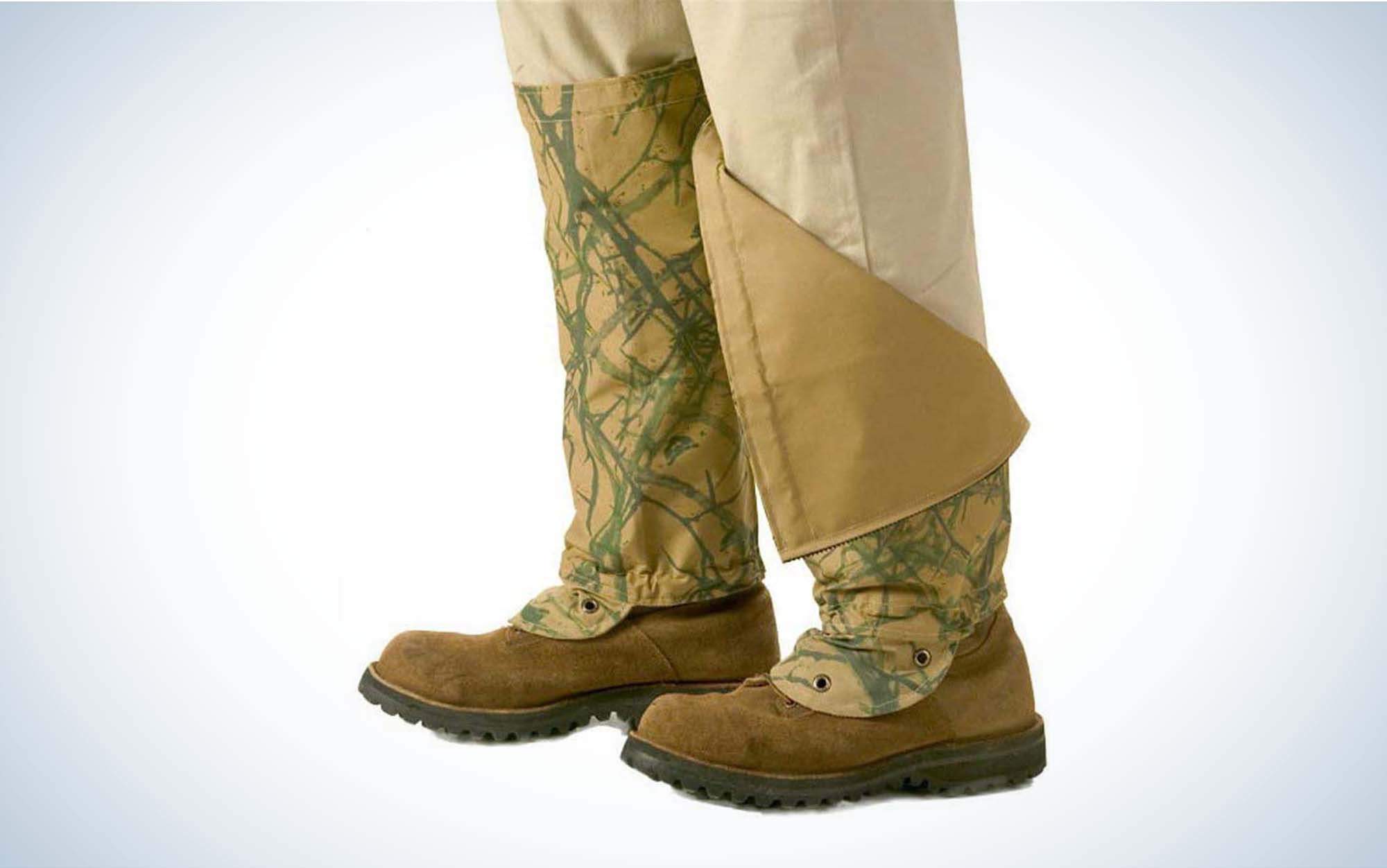We may earn revenue from the products available on this page and participate in affiliate programs. Learn More ›
Updated Jun 30, 2023 4:34 PM
When I’m turkey hunting creek bottoms or overgrown field edges, snake boots provide me with the reassurance that my feet and legs are safe from snake bites. And when I try to slip in on a roosted tom in the dark, even if I happen to step on a snake, I’m still protected. Spring turkey season isn’t the only time I use snake boots. As a forester, I spend almost everyday in the woods, with snake boots on my feet. Throughout my career, I’ve worn several pairs, and the best ones always provide enough snake protection without sacrificing breathability. Whether you’re hunting, scouting, or working, the best snake boots should fit those applications and protect you from snake bites.
How I Tested the Best Snake Boots
For this review, I relied on a decade’s worth of experience as a forester who spends almost everyday of the year outside. I also used my previous hunting experience and tested other boots that I hadn’t worn before. To test these snake boots, I logged several miles this summer foraging, setting trail cameras, and scouting new deer ground through prime snake habitat. I considered each boot’s overall fit, breathability, and durability of the snake guards or uppers.
Best Snake Boots: Reviews and Recommendations
Best for Turkey Hunting: LaCrosse 4XAlphas
Key Features
- Weight: 5.45 pounds
- Height: 16 inches
- Adjustable rubber gusset
- 100 percent waterproof
Pros
- Comfortable insoles
- Durable outsoles
- Lightweight
- Rated for mild temperatures
- Great traction
Cons
- Can get warm on all-day hunts
- No heel kick
The durable uppers on the 4XAlphas are reasonably breathable and provide plenty of mobility. For a rubber boot, the comfort level is as good as it gets. If you’re a fan of the classic Granges, you’ll be impressed with the 4XAlphas. They’re lightweight for a rubber boot, making long walks to listening points or gobbling toms a breeze. The Snake Guard is durable but flexible enough that it doesn’t restrict movement. And thanks to the adjustable gusset, you won’t hear the uppers slapping against your calves while you’re walking.
Between spring rains, creek crossings, and bottomland gobblers, turkey hunting requires serious waterproofing, and I’ve had zero issues keeping my feet dry in these boots. I also wore them this summer while foraging chanterelles. Harvesting these mushrooms requires a lot of squats that flex the soles of the boot. Luckily, these boots include extra layers in areas of the sole that receive the most stress from flexing. I’ve had issues with other brands cracking or splitting at the toe and instep but so far, the 4XAlphas have held up. Whether you’re trying to set up in the dark or slip through a creek bed, the 4XAlphas are some of the best turkey hunting boots to keep the snakes at bay.
Best for Hot Weather: Dryshod ViperStop
Key Features
- Weight: 6.72 pounds
- Height: 17 inches
- Scent control material
- Adjustable gusset
- True to size
Pros
- 100 percent waterproof
- Puncture resistant soles
- 5mm insulated bootie
- Breathable airmesh liner
Cons
The Dryshod ViperStops have excellent stability and support for a rubber boot, and the insulated layer wicks moisture extremely well. Constructed of durable, genuine natural-rubber overlays, the Dryshod ViperStops are tough. The four-way stretch lining and added heel kick make these boots easy to take on and off. And the adjustable gusset allows for a snug fit, regardless of leg size.

I wore these boots while setting and checking trail cameras on a property with hills and creek crossings and found that they offered great ankle support while I climbed up and down slippery banks. The liners also do an admirable job of wicking moisture, which is a necessity where I work and hunt. They kept my feet dry on the most humid days, but that also means they’ll stay reasonably warm when the temps start to drop. These would make the best rubber hunting boots for early season archery in areas with a combination of hilly terrain and creek bottoms. However, all that snake protection comes with weight, and these can get heavy on especially long treks.
Best Leather: Danner San Angelo
Key Features
- Weight: 4 pounds
- Height: 17 inches
- Abrasion resistant uppers
- Adjustable gusset
Pros
- Molds to feet well
- Pull on
- Durable leather
- Roomy upper for larger calves
- One year warranty
Cons
- Not 100 percent waterproof
With a full grain leather and rugged abrasion resistant nylon uppers, these boots offer protection against both snakes and briar patches. For those that prefer a leather slip on boot for everyday work, the Danner San Angelo is a great option for safeguarding your feet. Like most leather boots, these require a break-in period but only a minimal one. I’ll often use snake boots or gaiters when I’m working in areas with thick brush for protection against thorns or briars. Some materials shred after a few trips through a briar patch or thick yaupon, but the abrasion resistant uppers on the San Angelos can take the abuse. And they’re comfortable enough to wear around the yard.
Best Budget: Frogg Toggs Winchester Vennom
Key Features
- Weight: 3.97 pounds
- Height: 16 inches
- Omnigrip traction lug outsoles
- Waterproof with breathable membrane bootie
Pros
- Great traction
- Ankle and leg support
- Removable orthopedic insoles
- Waterproof
Cons
The Winchester Venoms are a considerably lightweight, lace-up snake boot that offers good ankle support and traction at a budget-friendly price. The Winchester Vennom snake boots provide plenty of ankle support and offer a safeguard against snake bites at a reasonable price. If you don’t spend a ton of time outdoors but still want the added protection and waterproofing that these provide, they’re a great option. I’m usually skeptical about cheap boots that claim to be waterproof, but I’ve been impressed with these and haven’t had any leaking issues. They do feel a bit bulky, but if you’re in a pinch or need a pair of JIC snake boots, I’d have no problem recommending these.
Best for Big Calves: Irish Setter Mudtrek
Key Features
- Weight: 5.89 pounds
- Height: 17 inches
- Waterproof vulcanized rubber
- Scentban scent control material
- RPM lightweight durable outsole
Pros
- 100 percent waterproof
- Side zipper
- Plenty of room for larger calves
- Durable
Cons
The wide uppers on the Mudtreks make them a solid option for those with larger calves, and the side zipper allows for easy on and off. The Irish Setter Mudtrek Snakeguard is a versatile rubber hunting boot that has plenty of room for layering extra bottoms or for those with big calves. My job requires me to walk several miles everyday, so my calves are large for my build. Because of this, I’ve had trouble removing some rubber boots, especially after sweating all day—but not with these. The wide uppers, heel kick, and side zippers make putting them on and pulling them off easy every time. I’m also a fan of the tread on the outsoles. Mississippi has a lot of clay soil and heavy rains. Those two make creek crossings a balancing act, but the tread on the Mudtreks takes them in stride.
Best Gaiters: Turtleskin Snakearmor Reversible Snake Gaiter
Key Features
- Weight: 0.75 pounds
- Height: 16 inches
- High-strength ballistic fiber
- Nylon storage bag
Pros
- Super lightweight
- Flexible
- Packs well
- Extremely durable
Cons
- Tend to ride up legs
- Traps heat if the top is cinched tight
Through my years in forestry and hunting, these gaiters have been the most reliable and durable form of snake protection. These gaiters have been my go-to while working in snake country. The pair I own has seen countless miles and hours of use over the last eight years, and they’re still as effective as the day I bought them. And it’s no coincidence that the majority of foresters that do timber inventory use them. Most gaiters are stiff and bulky with a hard plastic construction. But Turtleskins are extremely flexible and weigh less than six ounces each. You’ll forget you’re wearing them, which is fantastic for long days afield. They’re also waterproof enough for dewy fields or grass, but they won’t keep you dry if you’re walking in standing water.
My biggest complaint is that they ride up your leg. However, I remedied this by attaching a small bungee strap to an eyelet and running it under my boot and securing it to the eyelet on the opposite side, which works brilliantly. Unlike the best snake boots and other brands of gaiters, these fold up and pack down in the included nylon bag.
Things to Consider Before Buying the Best Snake Boots
All snake boots serve the same purpose, but the type of boot you need depends on how many miles you plan to put on them, the time of year, and whether you’re working or hunting in them. No matter what you’re doing, there are several options that excel for each category.
Insulation
Because you’re dealing with snakes and warmer temps, insulation isn’t a huge concern. However, if you want warmer boots for your turkey season’s opener and snake protection for when temps heat up, you can get away with a boot that has more insulation (something in the 800g range). Or you can always run a boot with less insulation and pair them with some of the best hunting socks. But, if you want a snake boot that you can use for summer scouting, foraging, etc., you’ll need to ditch the insulation, unless you want to sweat through your socks or create blisters.
Terrain and Habitat
Whether I’m doing inventory timber cruises or hunting new ground, I take several footwear options with me. The choice I make for a given day is ultimately determined by the terrain and habitat each property presents. If you’re on ground that’s constantly wet, a rubber boot is probably best. For steep, rocky terrain, a lace-up boot will give you better support for navigating ground with inconsistent footing.
However, in areas where the absence of fire has created thick underbrush in pine or monotonous timber stands, particularly in the South, I recommend a durable leather boot paired with a set of snake gaiters. In this type of habitat where briars or other aggressive plants are a given, abrasion resistance becomes important for the life of your snake boots. Most rubber boots won’t hold up under those conditions.
Purpose
Consider your activities so you’re not disappointed in an otherwise good boot that’s being used outside of its capabilities. The amount of miles you put on your snake boots will bring the comfort level to the forefront. As a forester, I’m in the woods year-round and walk close to 10 miles per day. My approach to protecting myself at work differs from other things like summer mushroom foraging, scouting for deer, or turkey hunting. I’m typically on dry ground when I’m working and given the number of miles I walk, I usually prefer a lightweight, comfortable option. This can also apply to extensive scouting trips.
But, when I’m gathering summer mushrooms, which often leads me to wet conditions and requires less walking than a workday, I just need a rubber boot to keep my feet dry. The same goes for turkey hunting or for early archery season whitetail.
FAQs
Q: Can snakes bite through rubber boots?
Whether snakes can bite through a rubber boot depends on a few different factors. First, the length of venomous snakes’ fangs varies between species. While it’s not likely that a coral snake could penetrate your average rubber boot, it’s possible that many rattlesnake species could. This is where material comes into play. Most soft rubber gardening boots will give you minimal protection, if any, when it comes to a rattlesnake bite. A general, all-purpose, work type rubber boot made of durable rubber and a hard outer shell may keep you safer than a gardening boot. Still, it’s best to go with a boot specifically designed to resist snake bites.
Q: Are cowboy boots snake proof?
Again, this too depends on several factors but in short, no, cowboy boots aren’t snake proof. The snake species, bite location, thickness of leather, and height of the uppers are a few that come to mind. Most cowboy boots don’t reach the adequate height to keep you safe from snake bites like other boots. The thickness of the leather is also much thinner than boots that are rated for snakes.
Q: Will muck boots stop a snake bite?
If you’re in an area with an abundance of venomous snakes, I wouldn’t trust the thin neoprene of a regular Muck boot to stop a snake bite. It’s possible that it would protect you against some species with shorter fang lengths, but I wouldn’t take the chance. If you want the full assurance of snake protection, you need a snake boot.
Why Trust Outdoor Life?
Since 1898, OL has been a leading authority in testing and reviewing hunting gear, fishing tackle, guns and shooting equipment, and much more. We have more than a century-long history of evaluating products, and we’re now bringing that expertise to online reviews. Our editors are experienced outdoorsmen and women, and most importantly, we’re trained journalists. We prioritize field testing and objective data when reviewing products. We conduct interviews with gear manufacturers and engineers as well as outdoor experts so that our readers have an understanding of how and why a product works—or doesn’t.
Advertising does not influence our gear reviews and it never will. While we always focus our coverage on standout products—because we want our readers to be aware of the latest and greatest gear—we also cover the flaws and quirks of any given product.
Final Thoughts
Living and working in the deep South, I’ve learned that snakes don’t care about the calendar. There’s no specific day or even month that snakes decide to emerge from dormancy. It’s all about the day’s temperature. In much of the South, you might see a snake any day of the year. I’ve seen cottonmouths basking in the sun in November and Diamondbacks crossing logging roads in February.
Luckily humans aren’t on the list of prey for snakes in North America, nor do they see humans as a threat, until humans act like one. In fact, bites to the legs and feet occur much less than bites to the hands, which usually occur when some one tries to catch or kill a snake. This study explored how often snakes strike at the lower extremities of passing humans. Most snakes in the study refrained from striking when a person simply walked past. The snakes that did strike only did so after they were stepped on. While snake bites might not be as large a threat as our fears make them to be, having a pair of the best snake boots for caution while you’re in the woods is never a bad idea.

